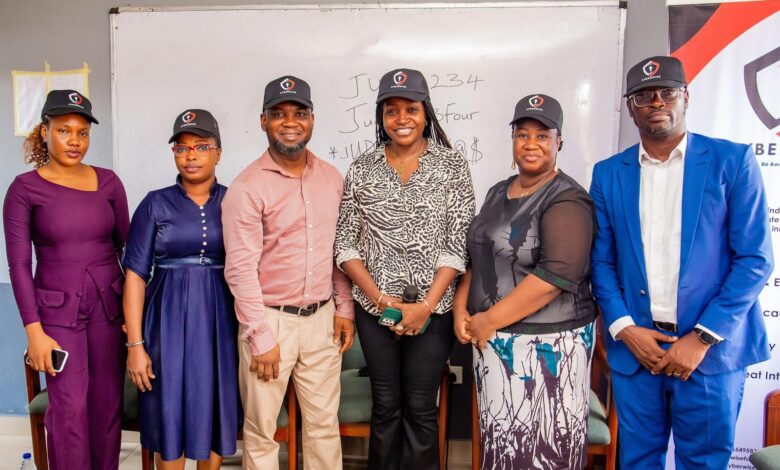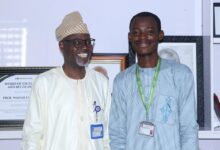Cyberwise takes cybersecurity awareness to Dr Soyemi Memorial Secondary School

Students of Dr Soyemi Memorial Secondary School, located in the FESTAC area of Lagos, have been enlightened on cybersecurity at the cyber awareness and enlightenment workshop organised by Cyberwise Foundation on April 30, 2025.
Members of the Cyberwise Foundation, led by the founder, Olukunmi Abbas Owoade, met the students in high spirits and took them on a journey into protecting themselves from cyber threats.
Owoade
Governance, Risk and Compliance (GRC) team lead with proficiency in Security Operations Centre (SOC), Kolapo Famojuro, made an engaging presentation on cybersecurity, identifying common online threats as phishing, social engineering, identity theft, malware, cyberbullying and ransomware.
He described phishing as the practice of sending fraudulent communication that appears to come from a legitimate and reputable source, usually through email and text messaging. The goal is to steal money, gain access to sensitive data or install malware.
According to him, some types of phishing include smishing (SMS-based), vishing (video-based), spear (targeted at a specific person, not a group of people) and whaling (such as Business Email Compromise).
Mr Famojuro advised the students on certain precautions to take when dealing with phishing attacks. He urged his listeners not to share personal information online, such as NIN, BVN and bank card details and always verify before downloading items or clicking on unsolicited links especially the ones that offer free gifts like data bundles.
Famojuro
Famojuro also acknowledged that while it is fun to post on social media, users must be careful of what they share about themselves especially location and luxury items and must also leave digital footprints and trails that are acceptable in society.
He also spoke extensively about artificial intelligence (AI), listing some of the risks associated with it as lack of transparency, bias and discrimination, privacy concerns, ethics, security, dependency on AI, concentration of power and hallucination.
The workshop’s moderator, Olabisi Lawanson, ensured to keep the students engaged in activities to show their understanding of the subject matter.
The second facilitator, Ayomide Olasupo, said cyberbullying can come in the form of flaming tactics where a bully uses profanity and vulgarity to provoke a minor online. She noted that trolls like anger and want other people to be miserable like them.
She urged young people not to engage with trolls but to block and report them, save evidence, tell a trusted adult, build a support network and use helplines.
Olasupo
Ms Olasupo also got the students to pledge to be kind and respectful online, to be upstanders rather than bystanders and to keep the internet a happy and safe place for everyone.
She concluded with the term “THINK”, advising that before sharing any material online, one must ask pertinent questions: Is it TRUE? Is it HELPFUL? Is it INSPIRING? Is it NECESSARY? Is it KIND?
One of the students (name withheld) shared her experience with cyberbullying. She said a male adult sent her nudes online and asked for hers. The student said she told her mother about it and the contact was immediately blocked, emphasising the need for young people not to hide such cases from a trusted adult around them.
Following this was a panel set up to further dissect the concept of cybersecurity.
Among the discussants were the school’s counsellor, Victoria Ojemakinde, the school’s information technology teacher, Omolara Adesanya, Famojuro and Olasupo. The session was moderated by Mr Owoade.
Mrs Ojemakinde urged students not to share nude pictures or their location or parents’ financial status. She also encouraged them to define their happiness, stating that “Whatever intimidates you is because you allowed it.”
On safe internet usage, Mrs Adesanya advocated the use of strong passwords which should include special features and capital letters.
Famojuro also spoke briefly about deepfakes: a concept for digitally manipulated images, videos or audio created using artificial intelligence (AI). He advised the students not to expose their fingerprints when taking pictures that will be posted on social media as they can be manipulated by cyber criminals.
Students who participated actively were presented branded gifts from Cyberwise Foundation.
Speaking with Vanguard after the workshop, an SS1A student, Chimbuchi Chukwueze, said: “I learnt we should always be careful of what we do on the internet so we can protect ourselves and others around us.
“Today, I see many people posting mean comments especially on TikTok and Instagram. From now on, I want to try not to be like them but to post good comments to encourage people.”
He also encouraged Cyberwise Foundation to keep up the good work, stating that cyber awareness is very important in today’s world.
Also, Ulueme Favour, an SS2A student, explained what she learnt from the workshop. “I learnt that we should not put our personal data on a site that we’re not sure of. Whenever I see a website that is not genuine, I will be able to identify it because of what I learnt from Cyberwise. I’d like to thank Cyberwise for imparting such wonderful knowledge to me, for making me cyber-wise,” she said.
An SS2A student, Amarachi Odidi, said, “I learnt how to be cyberwise and how to improve my social life on the internet. I have also learnt not to be very dependent on AI. I also learnt about cyberbullying and how to report cyberbullies.”






